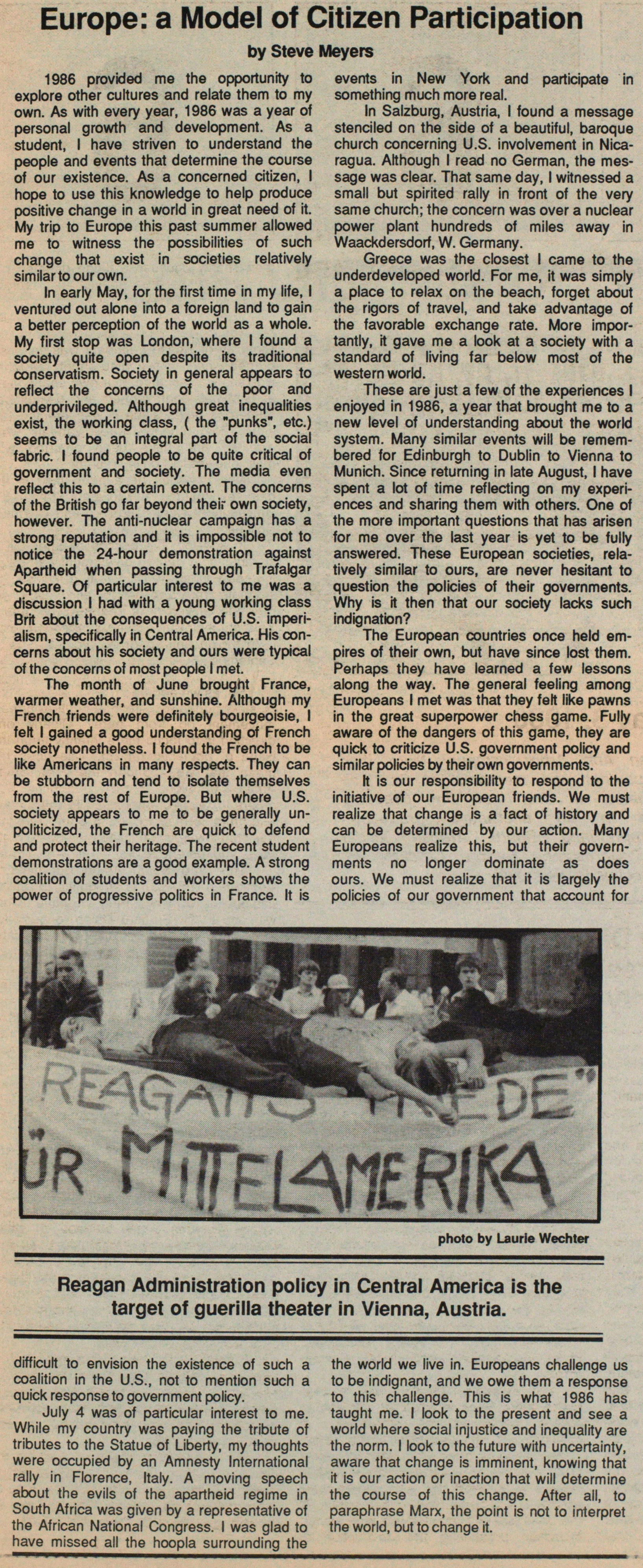Europe: A Model Of Citizen Participation

1986 provided me the opportunity to explore other cultures and relate them to my own. As with every year, 1986 was a year of personal growth and development. As a student, I have striven to understand the people and events that determine the course of our existence. As a concerned citizen, I hope to use this knowledge to help produce positive change in a world in great need of it. My trip to Europe this past summer allowed me to witness the possibilities of such change that exist in societies relatively similar to our own.
In early May, for the first time in my life, I ventured out alone into a foreign land to gain a better perception of the world as a whole. My first stop was London, where I found a society quite open despite ts traditional conservatism. Society in general appears to reflect the concerns of the poor and underprivileged. Although great inequalities exist, the working class, ( the "punks", etc.) seems to be an integral part of the social fabric. I found people to be quite critical of government and society. The media even reflect this to a certain extent. The concerns of the British go far beyond their own society, however. The anti-nuclear campaign has a strong reputation and it is impossible not to notice the 24-hour demonstration against Apartheid when passing through Trafalgar Square. Of particular interest to me was a discussion I had with a young working class Brit about the consequences of U.S. imperialism, specifically in Central America. His concerns about his society and ours were typical of the concerns oi most people I met.
The month of June brought France, warmer weather, and sunshine. Although my French friends were definitely bourgeoisie, I felt I gained a good understanding of French society nonetheless. I found the French to be like Americans in many respects. They can be stubborn and tend to isolate themselves from the rest of Europe. But where U.S. society appears to me to be generally un-politicized, the French are quick to defend and protect their heritage. The recent student demonstrations are a good example. A strong coalition of students and workers shows the power of progressive politics in France. It is difficult to envision the existence of such a coalition in the U.S., not to mention such a quick response to government policy. July 4 was of particular interest to me. While my country was paying the tribute of tributes to the Statue of Liberty, my thoughts were occupied by an Amnesty International rally in Florence, Italy. A moving speech about the evils of the apartheid regime in South Africa was given by a representative of the African National Congress. I was glad to have missed all the hoopla surrounding the events in New York and participate in something much more real.
In Salzburg, Austria, I found a message stenciled on the side of a beautiful, baroque church concerning U.S. involvement in Nicaragua. Although I read no German, the message was clear. That same day, I witnessed a small but spirited rally in front of the very same church; the concern was over a nuclear power plant hundreds of miles away in Waackdersdorf, W. Germany.
Greece was the closest I came to the underdeveloped world. For me, it was simply a place to relax on the beach, forget about the rigors of travel, and take advantage of the favorable exchange rate. More importantly, it gave me a look at a society with a standard of living far below most of the western world.
These are just a few of the experiences I enjoyed in 1986, a year that brought me to a new level of understanding about the world system. Many similar events will be remembered for Edinburgh to Dublin to Vienna to Munich. Since returning in late August, I have spent a lot of time reflecting on my experiences and sharing them with others. One of the more important questions that has arisen for me over the last year is yet to be fully answered. These European societies, relatively similar to ours, are never hesitant to question the policies of their governments. Why is it then that our society lacks such indignation?
The European countries once held empires of their own, but have since lost them. Perhaps they have learned a few lessons along the way. The general feeling among Europeans I met was that they felt like pawns in the great superpower chess game. Fully aware of the dangers of this game, they are quick to criticize U.S. government policy and similar policies by their own governments.
It is our responsibility to respond to the initiative of our European friends. We must realize that change is a fact of history and can be determined by our action. Many Europeans realize this, but their governments no longer dominate as does ours. We must realize that it is largely the policies of our government that account for the world we live in. Europeans challenge us to be indignant, and we owe them a response to this challenge. This is what 1986 has taught me. I look to the present and see a world where social injustice and inequality are the norm. I look to the future with uncertainty, aware that change is imminent, knowing that it is our action or inaction that will determine the course of this change. After all, to paraphrase Marx, the point is not to interpret the world, but to change it.